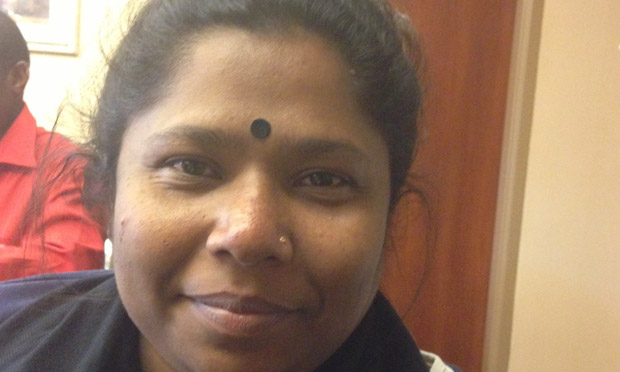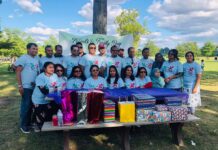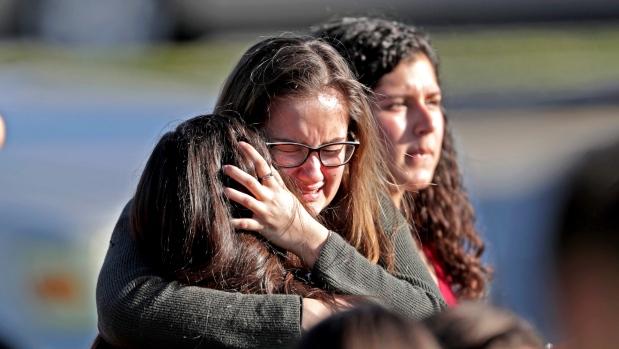Kalpona Akter, one of the best-known labor leaders in Bangladesh, has visited 16 American college campuses over the past three weeks, urging students to press two major retailers – The Children’s Place and Benetton – to contribute millions of dollars to help the families of those who died in the Rana Plaza factory building collapse.
Akter, joined by Mahinur Begum, an 18-year-old survivor of the factory disaster, was visiting the US to pressure companies to do more to improve apparel industry safety in Bangladesh and to contribute to a fund for victims of the Rana Plaza collapse, in which more than 1,100 workers died in April 2013.
But Akter, executive director of the Bangladesh Center for Worker Solidarity, faced several surprising setbacks during her trip. On Thursday, 27 protesters – including the Rana Plaza survivor and Akter – were arrested at the headquarters of The Children’s Place in Secaucus, New Jersey, as they sought to drop off a letter to the company’s chief executive. The police charged them with trespassing.
In an interview on Friday in New York City, Akter – who was released on Thursday after being held for two hours – was upset about the arrest, but far more worried about reports in the Bangladeshi media that she was urging Americans to boycott garments made in Bangladesh. She voiced concern that those reports made her sound like a traitor to the industry and to her cause: helping Bangladeshi workers.
An article in Bangla News 24, which describes itself as the nation’s No 1 “online news portal”, quoted a leading garment industry executive saying that Akter was “destroying the industry” and “was receiving money from foreigners and using it against the industry”.
Akter said the allegations were flatly wrong. “These jobs are important,” she said. “My very clear message: ‘We want these jobs, but we want these jobs with dignity.’ There is no point asking for a boycott.”
She has faced powerful tensions – and worse – with Bangladesh’s apparel industry and government. In 2012 Aminul Islam, a friend and fellow leader of the Bangladesh Center for Worker Solidarity, was found tortured and killed on a day when he was seeking to resolve a labor dispute at factories that run shifts for Tommy Hilfiger, American Eagle and other western brands. That murder has not been solved, although Islam’s supporters have suggested government security forces were involved.
In 2010 the government charged Akter and another leader of the solidarity center with inciting a riot and conspiring to set off an explosive device, after apparel workers went on a rampage and badly damaged several factories. Akter had been miles away from the disturbances. Soon after, the Bangladeshi prime minister called her and other labor leaders “enemies of the nation”.
The Bangladeshi government dismissed those charges in 2013, but only after the US government suspended its trade privileges with Bangladesh, largely in response to the Rana Plaza collapse. The Obama administration said Bangladesh had to do far more to ensure factory safety and labor rights to have its trade privileges restored.
Akter’s trip to the US was sponsored and organized by the International Labor Rights Forum, a not-for-profit advocacy group, and United Students Against Sweatshops, which has chapters on more than 150 college campuses. Noting that The Children’s Place had been a major customer of one of the factories in the Rana Plaza building before it collapsed, Akter and the two groups called on the company to contribute $8m to the Rana Plaza Donors’ Trust Fund. Thus far, The Children’s Place has contributed $450,000.
Customs documents show that The Children’s Place received shipments of more than 120,000lbs of clothes from the New Wave factory inside Rana Plaza in the eight months before the building collapsed, with a large shipment arriving in Georgia 19 days before the collapse. The Children’s Place said it was no longer having any garments produced in the building at the time of the collapse.
On Saturday, The Children’s Place did not respond to requests for comment. Last year its general counsel, Bradley P Cost, said the company was making “a large and long-term commitment to improve safety conditions for Bangladeshi garment workers”. The Children’s Place and 25 other North American retailers have set up the Alliance for Bangladesh Worker Safety to inspect and make safety improvements at Bangladesh garment factories.
Akter was dismayed that she now faces a 24 March court date in New Jersey, on charges of trespassing at Children’s Place headquarters.
Liana Foxvog, a spokeswoman for the International Labor Rights Forum, said: “All 27 of those arrested are facing charges. No charges have been dropped.”
Akter said the Rana Plaza survivor, Begum, who was caught in the rubble for 20 hours and lost a toe, was to present the letter to the company’s chief executive.
“The police told us to leave the building,” Akter said. “We were heading to the elevator to leave when someone from The Children’s Place told the police that they wanted to press charges, and then we were arrested.”
Foxvog urged worker advocates to contact The Children’s Place to ask it to do whatever it could make sure the charges were dropped.
Source: The Guardian










